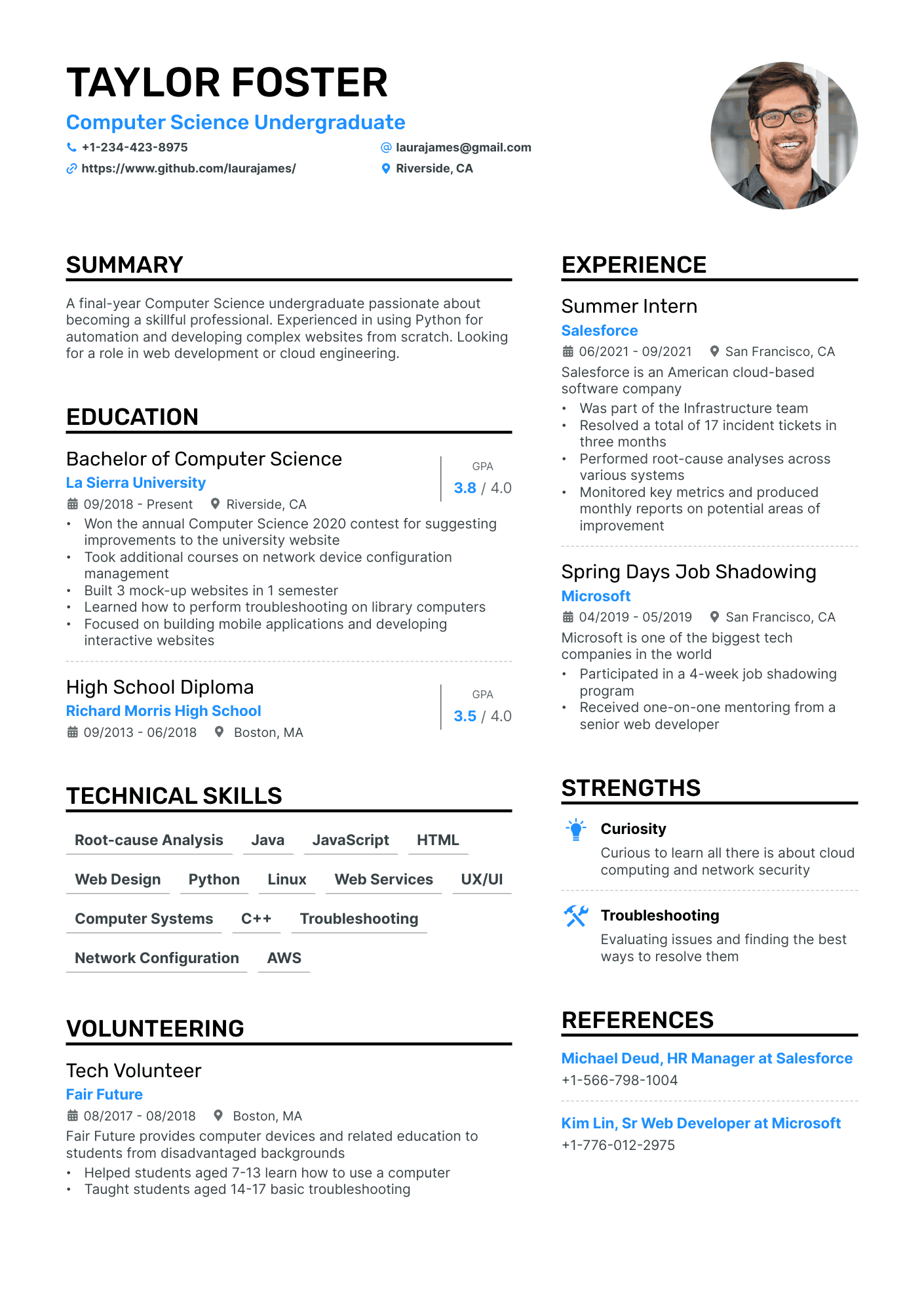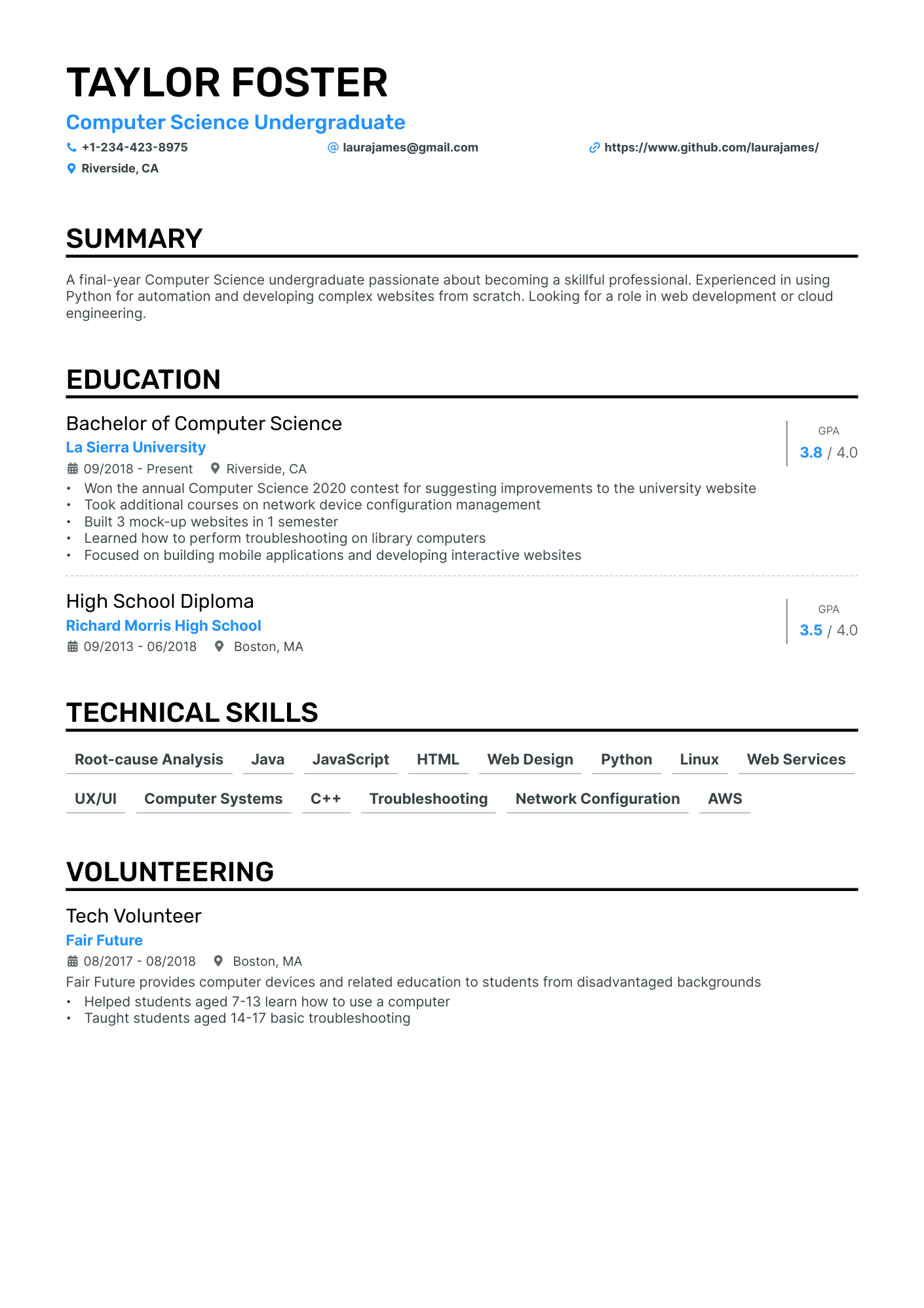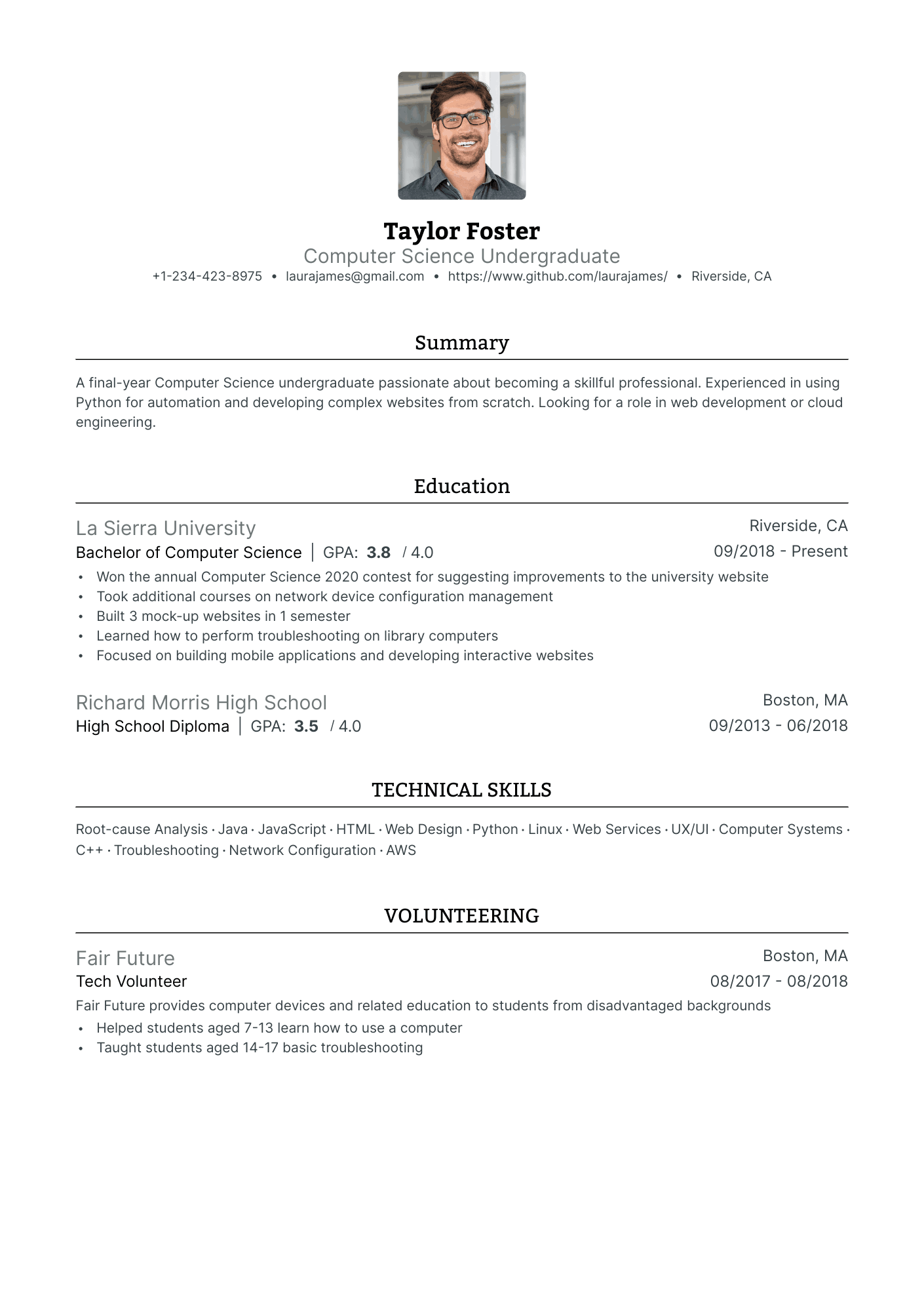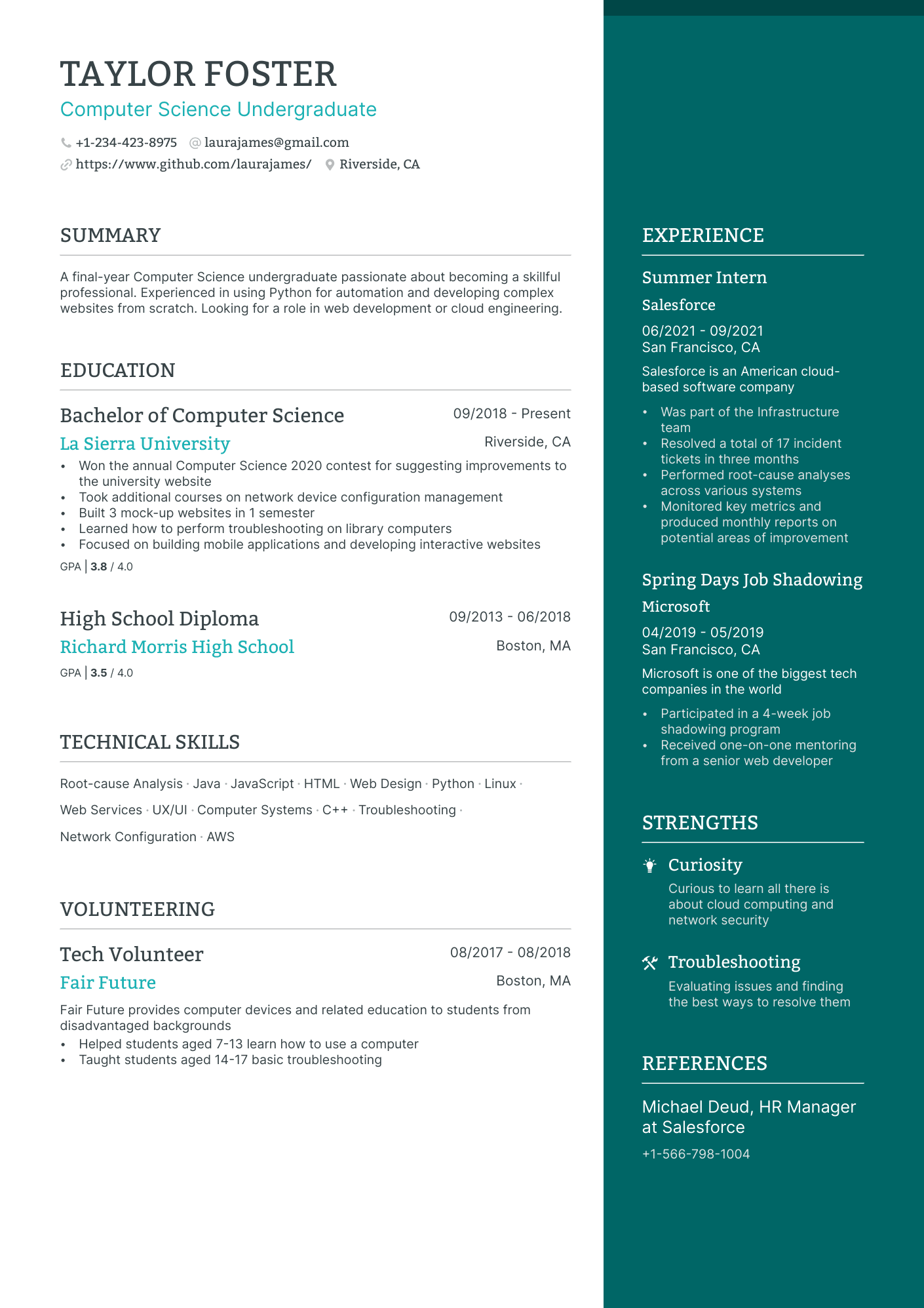What’s the first thing you think about when you hear the word ‘resume’?
If you’re like most people, probably something that instantly comes to your mind is ‘experience’. And that’s quite understandable.
Generally speaking, a resume is one of the easiest ways to demonstrate your experience and skills to potential employers.
But what if you have no experience? What should undergraduate students who have focused their efforts on studying put on their resumes?
Long story short: even undergraduates with no experience need strong resumes.
In fact, the experience section is just one bit recruiters pay attention to. There are many other things they want to learn about you.
For instance, your skills, ability to deal with challenging situations, general approach to conflict, desire to learn and grow, and many more.
And these things can make you stand out from other applicants - regardless of whether you’re looking for an internship or a full-time entry-level position.
If you’re keen to learn how to write an undergraduate resume that makes you stand out - read on!
Median earnings for bachelor’s degree holders are 84% higher than those whose highest degree is a high school diploma.
U.S. Bureau of Labor Statistics
This undergraduate resume guide will help you:
- Find out what sections your resume needs to have
- Craft a compelling resume summary that gets the attention
- Highlight your strengths and education without putting emphasis on your lack of experience
- Showcase your college activities in a way that fascinates recruiters
- Separate the wheat from the chaff and focus on what matters.
Looking for related resumes?
- Freshers Resumes
- College Resume
- Entry-level Resume
- Law School Resume
- Data Science Intern Resume
- Entry-level Engineering Resume
- Entry-level Sales Resume
- Intern Resume
- Marketing Intern Resume
- PR Intern Resume
- Social Media Intern
- Data Analyst Entry-level Resume
- Entry-level Financial Analyst Resume
The perfect format for your undergraduate resume
When looking for resume advice online, most things you’d find would typically include stuff like “talk about your education”, or “focus on your relevant hard skills”, or even “share why you’re the best applicant”.
But when you’re an undergrad with no experience whatsoever, general advice often sounds irrelevant and even inadequate.
In fact, you might be wondering what your relevant hard skills are and how to describe your education in a meaningful way.
We get that.
But we also know that you want to build a resume that gets the attention of recruiters in the most positive way possible.
And the first thing you should think about is the resume format.
Some of the most popular resume formats include:
- The reverse-chronological format
- The functional format
- The hybrid format.
Now, the reverse-chronological format is not really something you, as an undergraduate, should consider. It’s more suitable for professionals with long years of experience.
The functional format, on the other hand, is great for inexperienced undergraduates who want to emphasize their transferable skills, interests, and activities.
And if you have some experience to mention, go for the hybrid resume format. It’s a combination of the first two that allows you to focus on both your experience and your personality.
Some general tips to keep in mind include:
- Choosing a 12p font
- Using 10” resume margins
- Sticking to a one-page resume format (two-page resumes make sense only if you have over 10 years of experience)
- Saving your resume as PDF.
Once you’ve mastered the formatting, another question comes up: what should your undergraduate resume include?
Something great about undergraduate resumes is that you can experiment with sections. Here are some worth considering:
Top sections for your undergraduate resume:
- Header - for your name, email address, phone, and a link to your LinkedIn or personal website
- Objective - for your long-term vision and priorities
- Skills section - for your hard, soft, and transferable skills
- Education section - for all your degrees and relevant courses
- Certification section - for your certifications
- Strengths section - for the qualities that make you stand out from others
- Achievements section - for the times your hard work paid off.
When you choose the top sections you want to include in your undergraduate resume, it’s important to add specific information that recruiters value. For instance:
What recruiters love seeing on undergraduate resumes:
- The top courses you’ve taken and how they relate to the job you’re applying for
- Some of the challenges you’ve faced and how you’ve dealt with them
- Your ability to learn and master new skills quickly
- Whether you’ve done some volunteering or work shadowing
- What your biggest strengths are
- The things you’d like to learn more about
- Where you take inspiration from
- The awards you’ve received
- The publications you’ve published
- Whether you’ve taken any additional courses that have upskilled you.
The ideal header for your undergraduate resume
The header section is often treated as unimportant by many undergraduates. Probably due to the fact that it’s the shortest part of your resume.
However, if you make even the slightest mistake in your email address or your phone number, recruiters will not be able to get back to you.
So make sure your header section is free from mistakes. Let’s check out some examples:
2 undergraduate resume header examples
Can you spot any mistakes?
Firstly, look at the title - it says ‘Student’. It’s okay, but it’s far from perfect.
Ideally, here you would mention the position you’re applying for or at least your major.
Then let’s look at the e-mail address - it’s very informal. We advise you to stick to the name.surname@website.com, name_surname@website.com, surname.name@website.com format instead.
Then comes the location - it’d be better if Lesley had mentioned the city she currently resides in. That’s especially important if she’s applying for an on-site job.
Last but not least, the link. It leads us to Lesley’s personal Facebook account, and that’s a huge no-no. Especially if Lesley has some wild party photos in there.
Much better!
This resume summary looks much better and paints a much more precise picture of the applicant.
It starts by mentioning the person’s looking to become a journalist. In this way, employers know exactly what position would match the applicant’s wants and needs.
Moreover, this fits well with their link - we can assume that it leads to all articles Lesley has written for the university newspaper.
The email and location also look neat.
Now that’s a perfect header! Time to look at your undergraduate resume’s objective.
An inspiring objective to keep recruiters’ attention
Once you’ve decided what positions you want to apply to, it’s time to craft a resume objective.
Regardless of whether you’re in your first or last year of studies, a well-written resume objective can help you land an interview even when you have no work experience whatsoever.
That’s why describing how you’ll add value to the team is mandatory here.
Another thing worth considering is adding relevant keywords. This can help you pass applicant tracking systems that most recruiters use, even if you have little to no experience.
In short, think of your resume objective as a quick way to get recognition for your skills and qualifications from employers.
Let’s look at some good and bad resume objectives examples!
Focusing on what matters: 3 undergraduate resume objective examples
How does that resume objective make you feel?
Not too excited or impressed, right?
This automatically means you should stay away from such short, uninspiring objectives. Otherwise, you risk having your resume tossed in the bin.
Let’s try again:
Although this resume objective looks a bit better, it’s still far from ideal.
It’s a good idea to mention your top skills. However, linking them to the actual area of work or position is what would make you stand out.
Let’s give it one last try:
Now that’s something else!
This computer science undergraduate has done a great job in highlighting their education, interests, and top skills.
What’s more, they have also mentioned the position and field they’re interested in.
Pro tip
If you’re not sure where to start, you can always go to our resume experts for guidance!
It’s now time to move on to the next section, where we’ll discuss what needs to be done if you’re one of the few chosen undergraduates who have some work experience.
We advise you to read through that section even if you have no relevant work experience.
How to highlight work experience in your undergraduate resume
It’s common for undergrads to look for jobs - regardless of whether they’re doing it to get money or to get experience.
In both cases, there are some dos and don'ts when it comes to highlighting your previous experience. Be it relevant to what you’re applying for or not.
Generally speaking, your experience section should always include:
- The name of your previous employer
- The position
- The dates of employment
- A short description of the company
- Your main responsibilities
Let’s look at some examples first and discuss our findings after:
Right and wrong: 2 undergraduate resume experience examples
- •Served food
- •Greeted customers
- •Shift work
- •Always on time
Treat the example above as something you shouldn’t do.
Let’s start from the beginning.
The ‘position’ and ‘workplace’ fields look alright, but the description needs attention. Instead of plainly stating the place is a restaurant, this applicant could have said what kind of food the restaurant serves, for instance.
Also, look at the way they have listed their responsibilities. Do you spot anything wrong?
First off, there is no consistency. Some bullets start with verbs, others - with nouns or even adverbs.
Our advice is to always list your responsibilities using action verbs. They make you look responsible and ready to take action. And to be honest, recruiters love this.
Then, we need to look at the actual wording of the responsibilities.
Serving food requires valuable skills like attention to detail. At the same time, working in shifts means you have to be adaptable and have strong time management skills.
But as you can see, the applicant has not highlighted any of these transferable skills in their experience section.
See how this could have been done differently:
- •Helped customers choose their food according to their requirements and preferences
- •Delivered orders in a timely manner and according to restaurant policies
- •Improved my multitasking skills by covering 6-10 tables at a time
- •Guaranteed 100% customer satisfaction even during night shifts
See the difference?
Using action verbs and describing your responsibilities in detail makes a much stronger first impression than simply stating what you had to do.
What’s more, when you start thinking about the results of your work and how much you have actually achieved, you prepare for one of the most common interview questions - “Tell me about your experience”.
This piece of advice is also suitable for you if you have only volunteer experience.
The volunteering section: a great way to showcase your transferable skills
As mentioned earlier, not all undergraduates have experience.
Yes, those who do are usually considered lucky, but that’s mostly because they can prove they have the required skills.
The same goes for volunteering.
And while the volunteering section is a bit easier to tackle, there are still some things to keep in mind.
Inspiring change: 1 good and 1 bad volunteering section examples
Look at the example above. What do you get from it?
Not much, right? That’s why you should strive to do better.
The aim of every section of your resume should be to add value. So focus on this when describing exactly what you’ve done as a volunteer.
Let’s try again:
The second example helps you get a clearer understanding of the volunteer role and the skills required for it.
More specifically, it tells us that this person has great people-, event-, and time-management skills.
Speaking of skills, let’s look at the two different types of skills your undergraduate resume needs.
The top skills your undergraduate resume needs
As an undergraduate, you can often lack perspective regarding the skills you have and the skills you need to develop.
Knowing that there are two main types of skills - hard and soft - might make things easier for you.
In general, hard skills depend on your major and your interests. Some of the most popular hard skills for undergraduates include:
Hard Skills for undergraduates' resumes
- MS Word
- MS Excel
- MS Powerpoint
- MS Outlook
- C++
- Python
- Software development
- Web development
- Research
- Analysis
- CAD
- Linear progression
- HTML, CSS
- Troubleshooting
- Database management
- Editing
- Proofreading
- Writing
- MySQL
- Forecasting
- Data mining
- Data engineering
- Reporting
- SEO
- SEMrush
- Ahrefs
- Marketing
- Data visualization
- Photoshop
- Illustrator
- InDesign
- CorelDRAW
- Graphic design
- HubSpot
- UX/UI design
- Google Analytics
- Google Search Console
- Google Ads
- Meta ads
- Planning
- Budgeting
- Resourcing
- Agile
- Project management
- Kanban
- Scrum
- Financial modeling
- Performance tracking
If you’re pursuing a more technical degree (e.g. in Computer Science or Engineering), then you can also go for a section outlining your technical skills.
How to describe soft skills on an undergraduate resume
Recently, recruiters and applicants alike have started to put more and more emphasis on the importance of soft skills.
They are applicable to almost any industry and role, and that’s exactly why some of them are often called transferable skills.
For instance, if you’re an experienced problem-solver, you’d be able to adopt a problem-solving approach as a software developer, accountant, or even translator.
A great way to emphasize your soft skills is by adding a talent section to your undergraduate resume.
Here’s a list of soft skills worth considering by undergraduates!
Soft skills for undergraduates' resumes
- Communication
- Active listening
- Presentation skills
- Empathy
- Awareness
- Positive mindset
- Open-mindedness
- Conflict management
- Communication
- Cultural sensitivity
- Collaboration
- Encouragement
- Cooperation
- Coordination
- Idea exchange
- Mediation
- Negotiation
- Curiosity
- Self-management
- Decision-making
- Self-confidence
- Brainstorming
- Decision-making
- Team-building
- Resilience
- Self-motivation
- Lateral thinking
- Logical reasoning
- Initiative
- Persistence
- Observation
- Persuasion
- Calmness
- Optimism
- Analysis
- Negotiation
- Time-management
- Leadership
- Networking
- Public speaking
- Integrity
- Responsibility
- Initiative
- Diplomacy
- Goal setting
- Prioritization
- Planning
- Focus
- Stress management
- Organization
And while adding your hard and soft skills to a ‘strengths’ or ‘talents’ section is great, make sure to also include a separate skills section to your undergraduate resume.
This will help you pass applicant tracking systems (ATS) that screen applicant documents for certain keywords.
The education section: your time to shine
Since you’re still a student, the education section is something you should devote great attention to.
Make sure that you include the relevant courses you’ve taken and the highest grades you’ve received.
And remember: pointing out how different majors, minors, and projects have helped you develop certain skills and personal qualities will without a doubt impress recruiters.
It will also give them more insight into the industry knowledge you have and the value you can bring to the company.
And if you want to get bonus points, combine your undergraduate resume’s education section with a strong certificates section.
Certificates - the key to every recruiter’s heart
Certificates show you are willing to learn more than what’s expected from you. They also show you know how to put theory into practice.
That being said, they are a great way to stand out from other applicants and land an interview.
If you’re wondering which certificates are worth listing in your resume, think about the impact they have had on your life.
For instance, if you’re applying for a position in finance, a Power BI certificate would be much more relevant than a first aid certificate.
And remember: list only certificates you actually have.
If you’ve not taken any courses, then don’t include a ‘courses’ / ‘certificates’ section. Hiring managers can tell if you make skills and certifications up!
Top #3 undergraduate certificate types for your resume
- Foreign language certificates
- Soft skills certificates
- Technical certifications
Need more? Add some of these sections to your undergraduate resume!
Depending on the position, you could also include a section describing your language skills. When in doubt, ask yourself - would you need foreign languages to accomplish your day-to-day tasks?
If you feel creative, you could also add a non-traditional section to your undergraduate resume.
A pie chart of what your typical day looks like or a quote that’s turned into your life philosophy. You decide!
Just make sure to keep things professional. Follow the rule - if you wouldn’t share it with your tutors, don’t share it with your prospective employers!
Key takeaways: how to impress recruiters and land an interview as an undergraduate
- Choose the correct format for your undergraduate resume! We recommend the functional one, but it all depends on you
- Make sure you type your name, phone number, and email address correctly - you can’t hear back from recruiters if your contact details are full of mistakes
- Focus on crafting an inspiring objective that demonstrates what your contribution to the team would be
- If you have some experience to list, do it in an engaging and descriptive way
- Use the education section as much as you can - share more about the courses you’ve taken and link them to specific skills




